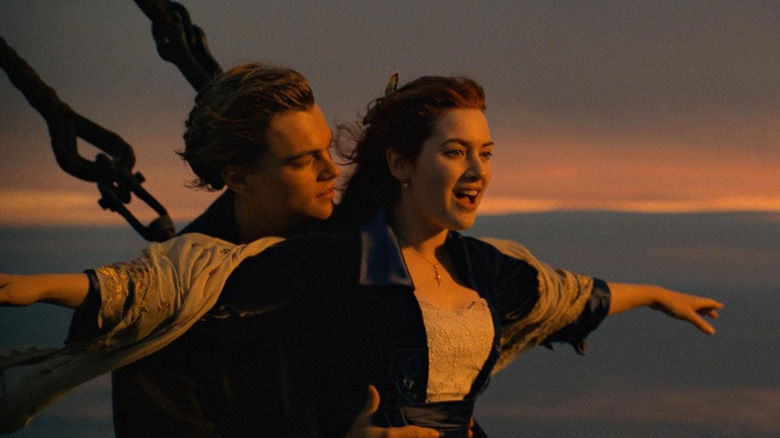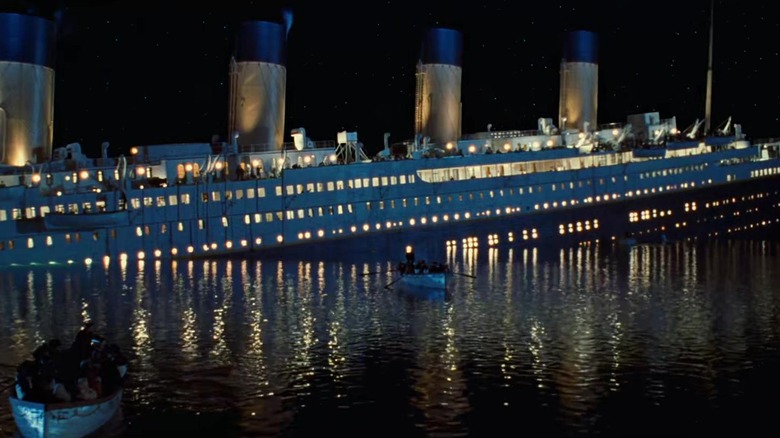The Titanic Gamble James Cameron Made That Everyone Thought Would Fail (Including Him)
James Cameron's "Titanic," when adjusted for inflation, is one of the highest grossing films of all time and is only exceeded by the likes of Cameron's own "Avatar" and Victor Fleming's pro-Confederacy epic "Gone with the Wind." Even when not adjusted for inflation, however, "Titanic" is still up there at the top, behind only Cameron's first two "Avatar" movies and Joe and Anthony Russo's "Avengers: Endgame." Even the 2025 animated Chinese mega-hit "Ne Zha 2" hasn't quite surpassed Cameron's romantic epic at the box office at the time of writing.
Those who were watching movies in 1997 and 1998 remember the overwhelming phenomenon. "Titanic" runs a whopping 195 minutes, yet scads of people saw it over and over again in theaters. It swept the Academy Awards, winning 11 of its 14 nominations. Its soundtrack was huge. "Titanic" opened on December 19, 1997, and was the #1 movie at the box office every week until the release of "Lost in Space" ... the following April. The world wouldn't see anything as enormous until Cameron's next movie in 2009. One can no longer talk about "Titanic" without first mentioning how overwhelmingly popular it was. For many years, it stood as the apex of a certain kind of pop Hollywood filmmaking.
It's hard to imagine, then, that "Titanic" was expected to become a huge bomb during its production. The film, as many know, was the most expensive movie ever made at the time, with its budget ballooning from an already gigantic $100 million to a then-unheard-of $200 million. Even the notoriously costly 1990s tentpole "Waterworld" hadn't been that expensive. The film was so over-budget, in fact, that Cameron has recalled planning for his career to be over while he was still in the middle of making it, convinced that "Titanic" could never possibly become profitable. It was by sheer luck that it became the phenomenon it did, eventually grossing over $2 billion at the global box office.
Indeed, Cameron has mentioned multiple times, including in a video interview with CNN to mark the film's 25th anniversary, that he didn't even think the movie would break even. "Titanic" was Hollywood's biggest gamble to date.
Cameron was highly skeptical of Titanic's box office prospects
In the CNN interview, Cameron was frank, recalling the arc of hopelessness that the film's crew was feeling during production:
"We didn't think it was going to make any money. Honestly. We went into it, and we [...] had gone from 'We'll never work again' to 'We'll probably get to work again, as long as we don't ever do another movie like 'Titanic.'"
Cameron was similarly frank when he spoke to Wired in 2009. He, along with everyone else who followed the development of "Titanic," remembered the steadily bloating budget and the missed deadlines. It's true: "Titanic" was initially supposed to be a summer release, but it wound up being pushed back to December 1997 to give Cameron enough time to finish shooting and editing the film. Cameron, meanwhile, was just as apprehensive as the movie's financiers, worried that he was making a film that couldn't possibly sell tickets. As the legend goes, Cameron kept a razor blade in his office, complete with a grim attached note that read, "Use only if film sucks." This wasn't a sign of depressive ideation, but it was an indication that Cameron was facing some dire stakes. As he put it:
"When we were filming 'Titanic,' [...] we were just trying to figure out how much money we were going to lose. [...] I just realized [when talking to a friend] I made a $200 million chick flick where everyone dies. What the hell was I thinking? [...] I'm going to have to rebuild my career from scratch."
Anything that costs that much these days is usually considered to be a "sure thing." When a "Star Wars" movie or a Marvel film costs $200 million, it's seen as a relatively low-risk investment, as those movies have generally turned a profit (at least in the past decade). When Cameron was making "Titanic," though, that kind of spending on a film was unheard of. "Titanic" had to be a hit, otherwise careers would end and businesses would shutter.
Over $2 billion later, the risk had been absorbed.
Titanic's got nothing on the budgets of today's tentpoles
Notably, a Washington Post article published in May 1997 quoted a few 20th Century Fox executives who were wary of "Titanic." The article observed that Paramount (which was handling the film's domestic distribution) and Fox (which was handling the international rollout) kind of had to stand by Cameron at that stage. After all, $200 million was way beyond the "cut and run" point. Tom Sherak, the head of Fox at the time, even became existential about "Titanic," saying:
"The bottom line is, nobody wants to spend that kind of money, but that's the way it turned out. [...] If it turns out to be epic, it will make money. But there will always be that conversation about: Is it too much money?' Should it be done?'"
"Titanic" did turn out to be epic, but the question remains: Is it too much money? The Post, way back in 1997, already noted that Hollywood was embracing a "bigger is better" mentality. This was a year in which the huge blockbusters of the day included "The Lost World: Jurassic Park," "Men in Black," "Air Force One," and "Liar Liar." Movies were getting more and more expensive to make, but "Titanic" seemed to cross a line. If only the studio executives at the time could have seen the overspending glut of the late 2010s and early '20s. Just look up the budgets for the "Jurassic World" movies sometime. Or the newer "Star Wars" and "Star Trek" films. Or the fifth "Indiana Jones" movie. Heck, look at garbage non-hits like the Russos' Netflix film "The Electric State." Or costly bombs like Todd Phillips' sequel "Joker: Folie à Deux." Money is being burned regularly.
Can a line be crossed? Hollywood does seem to be trying to curb its spending, as even superhero tentpoles and "Star Wars" movies aren't surefire hits anymore. But the industry will only continue to be encouraged to be irresponsible if even one out of every 10 mega-budgeted tentpoles comes out in the black. 1997 was merely the start. The present is so much larger.


